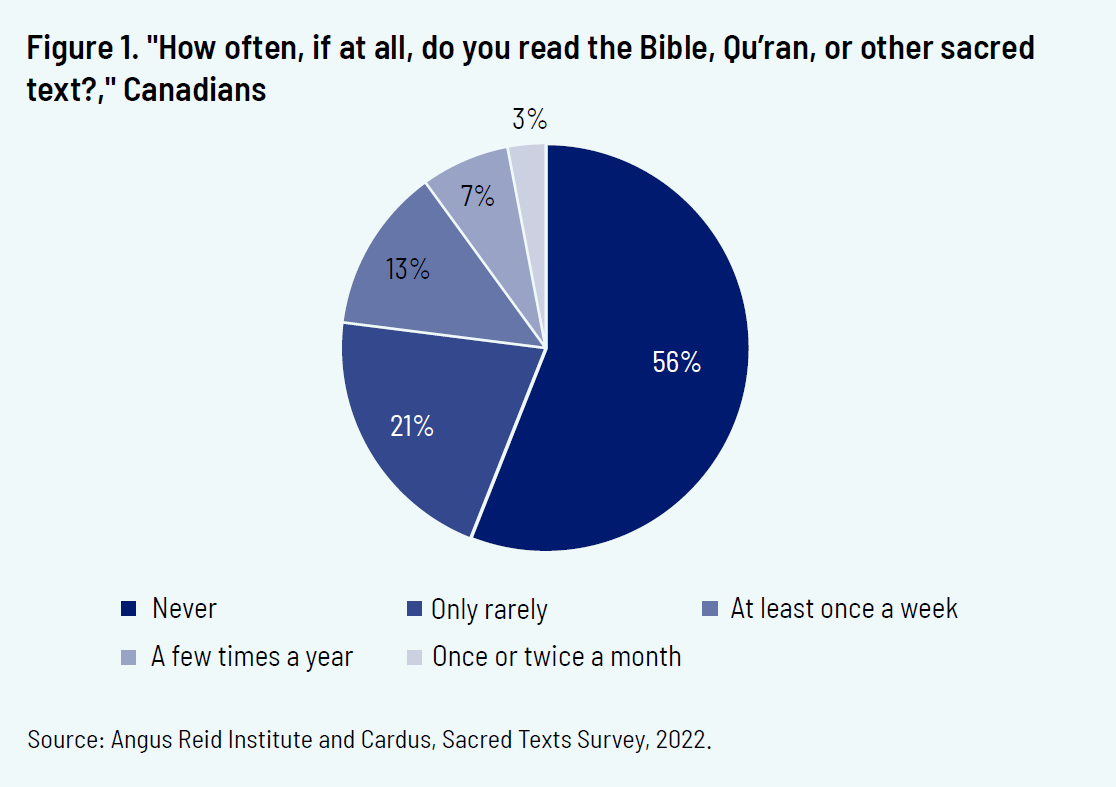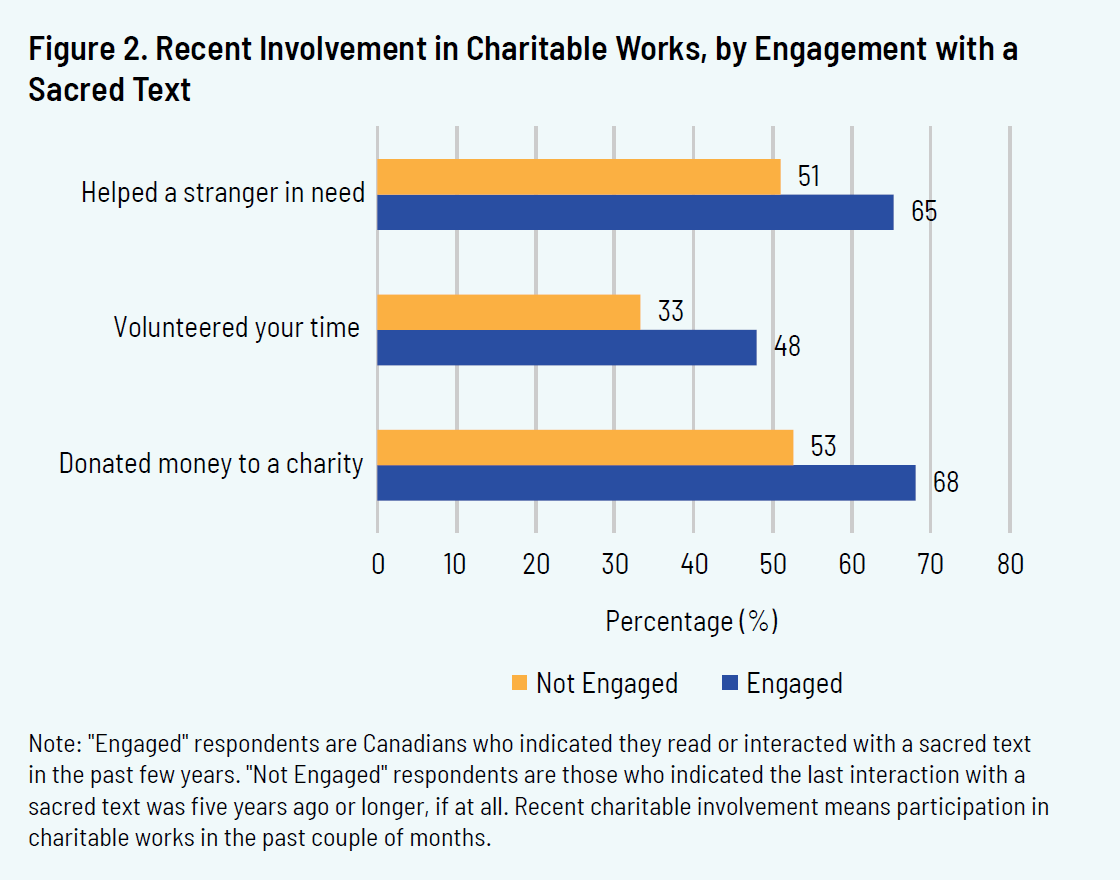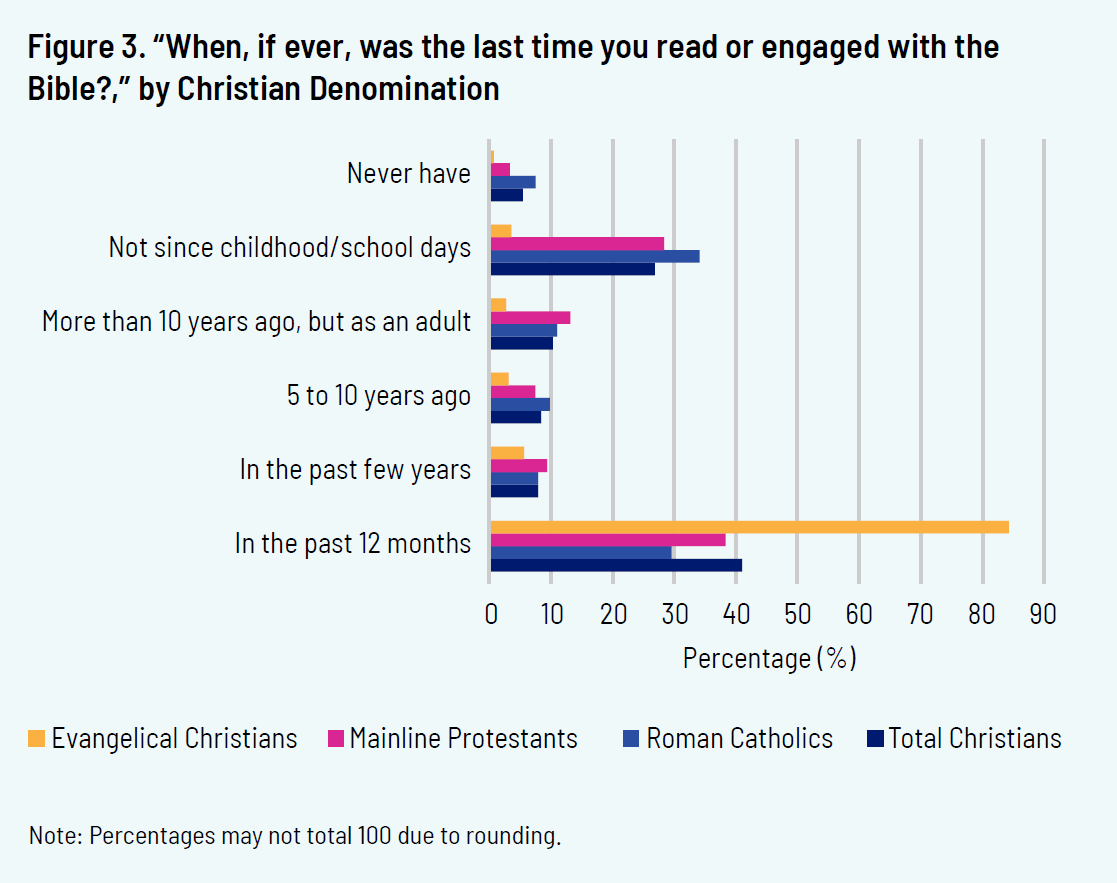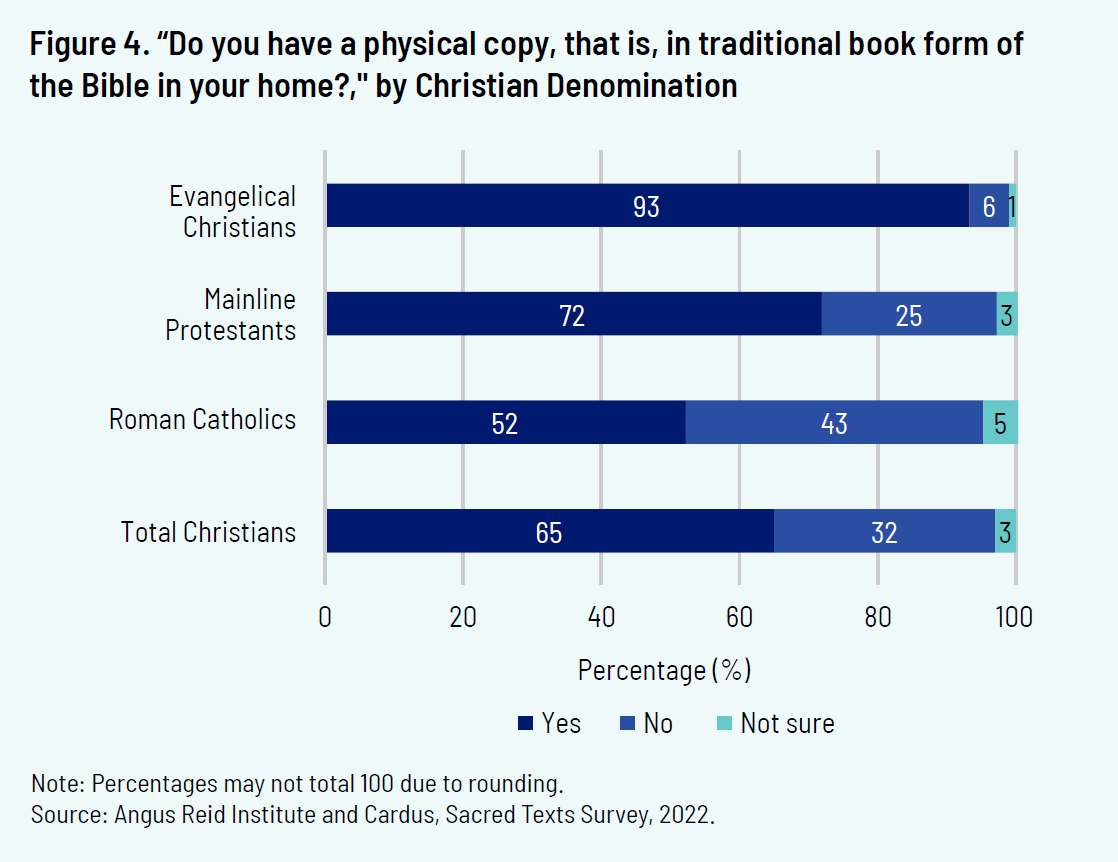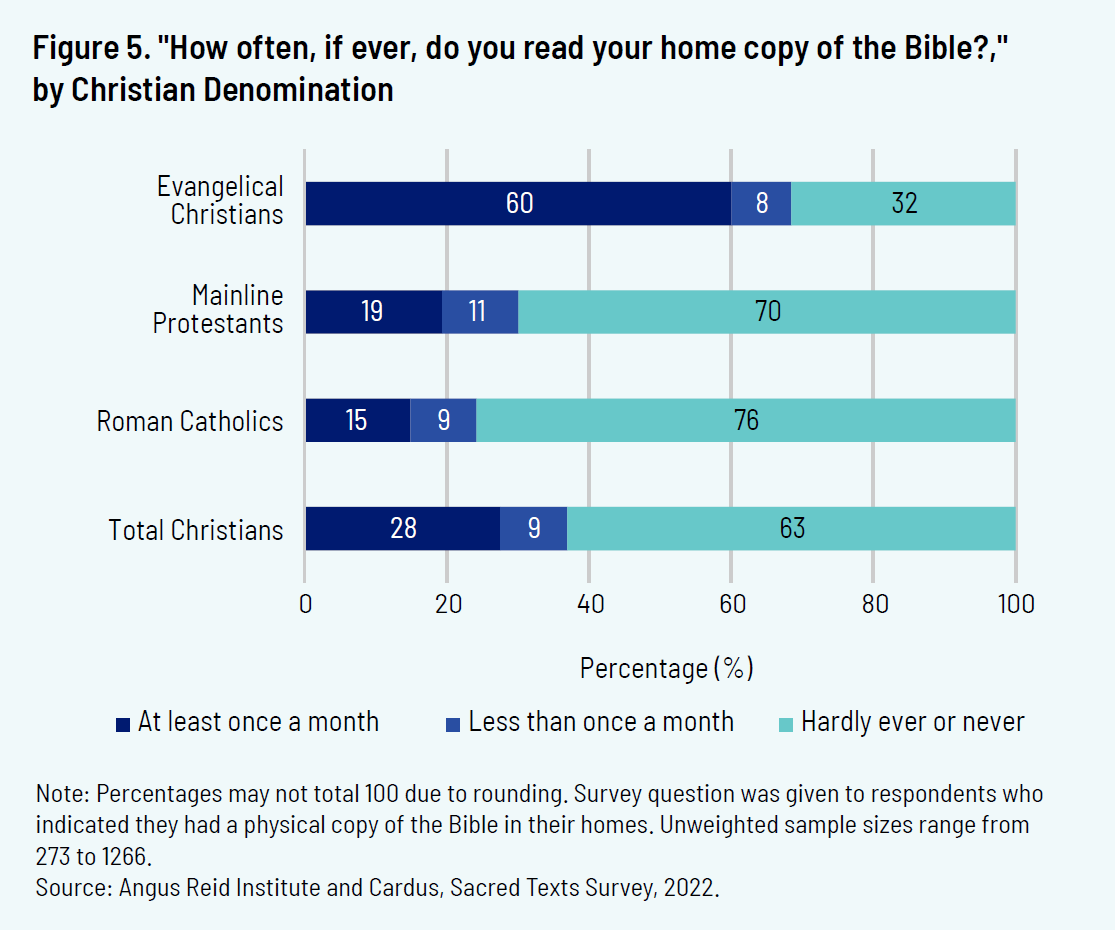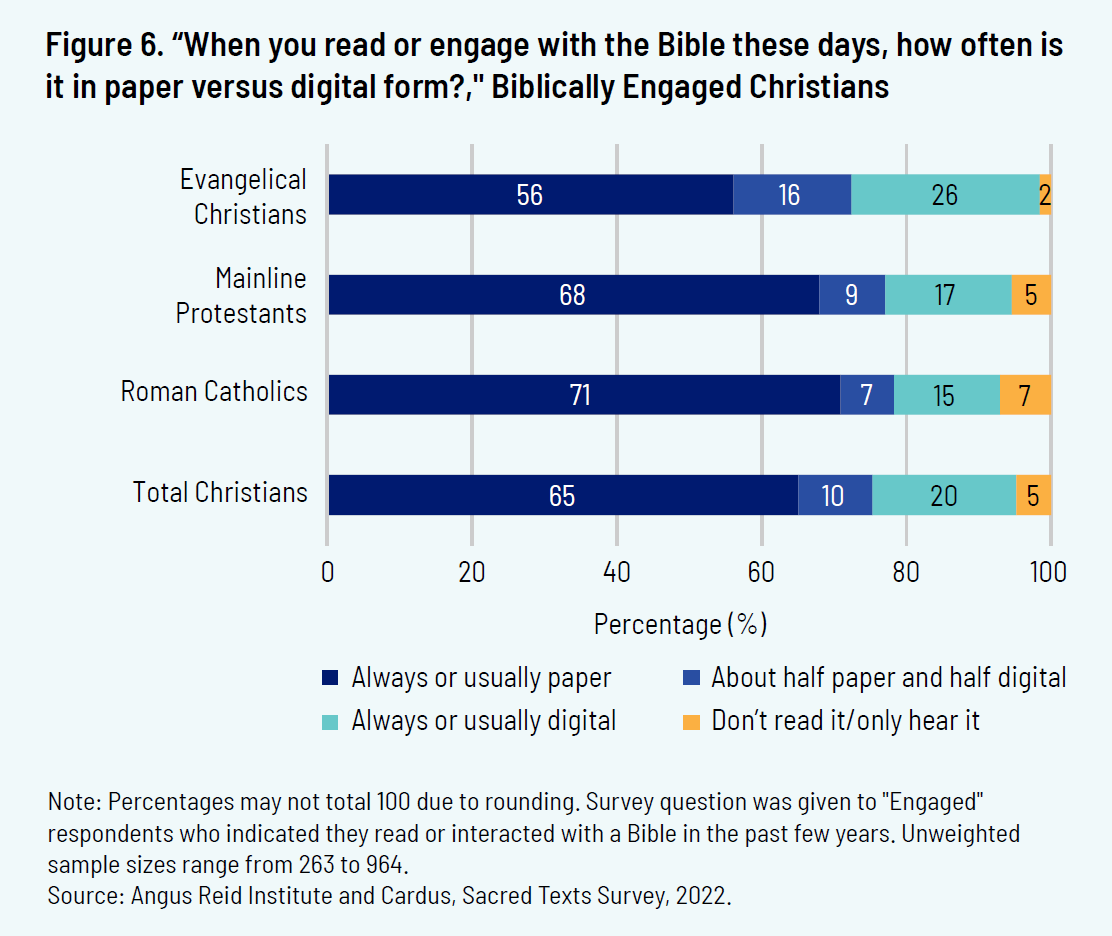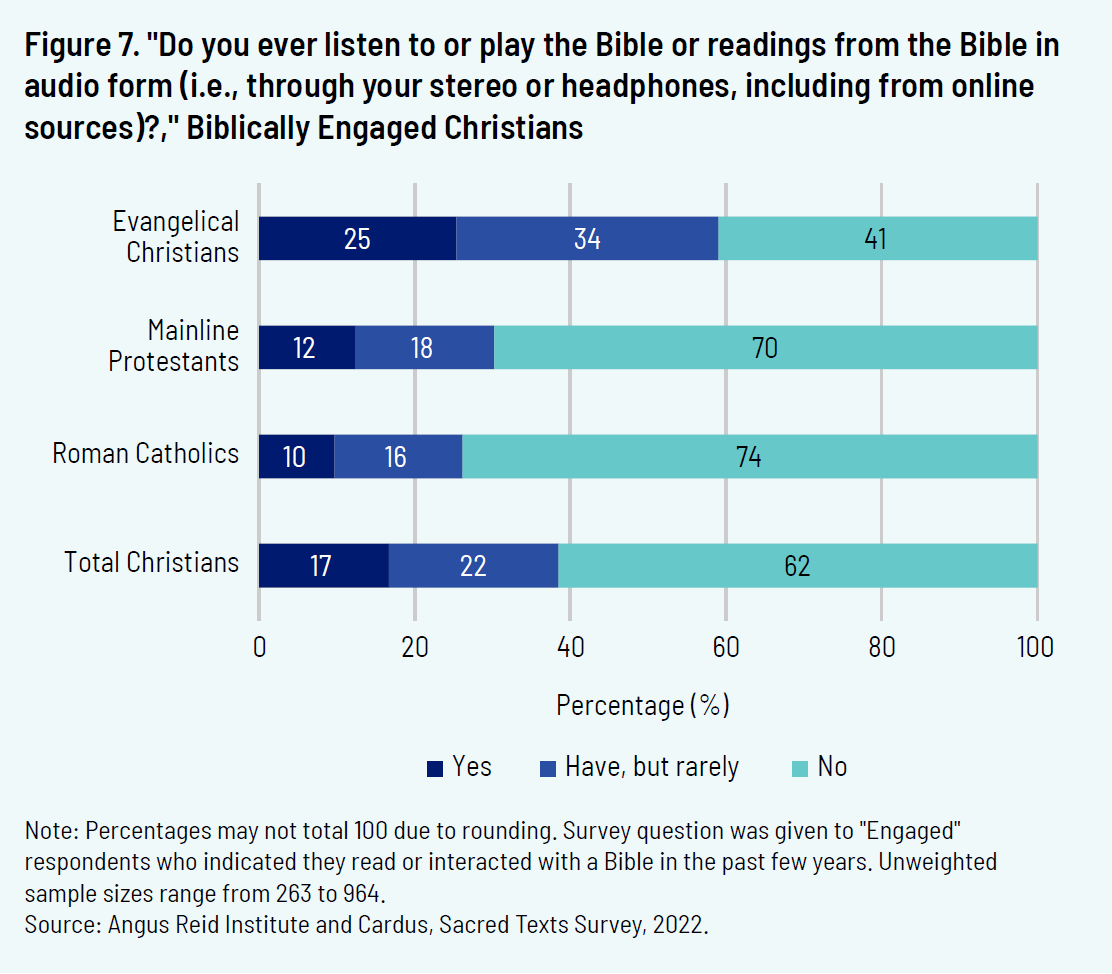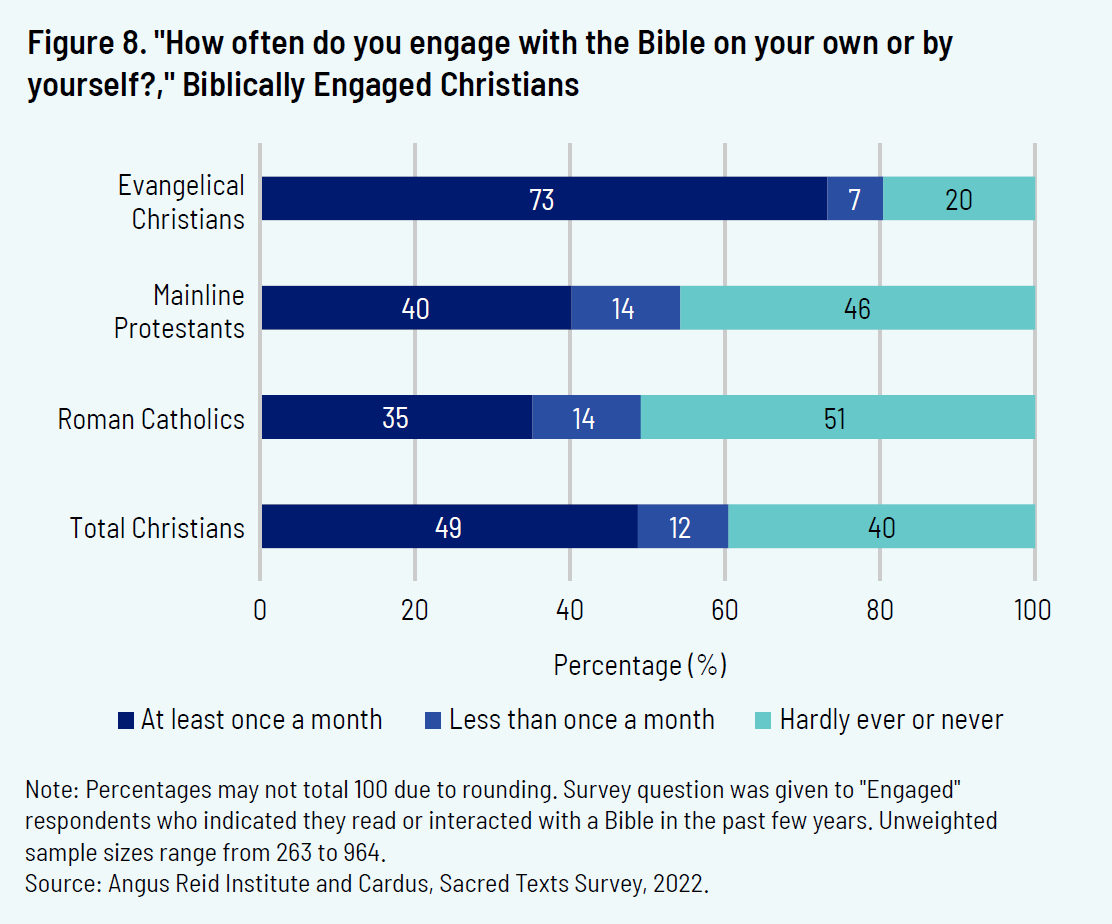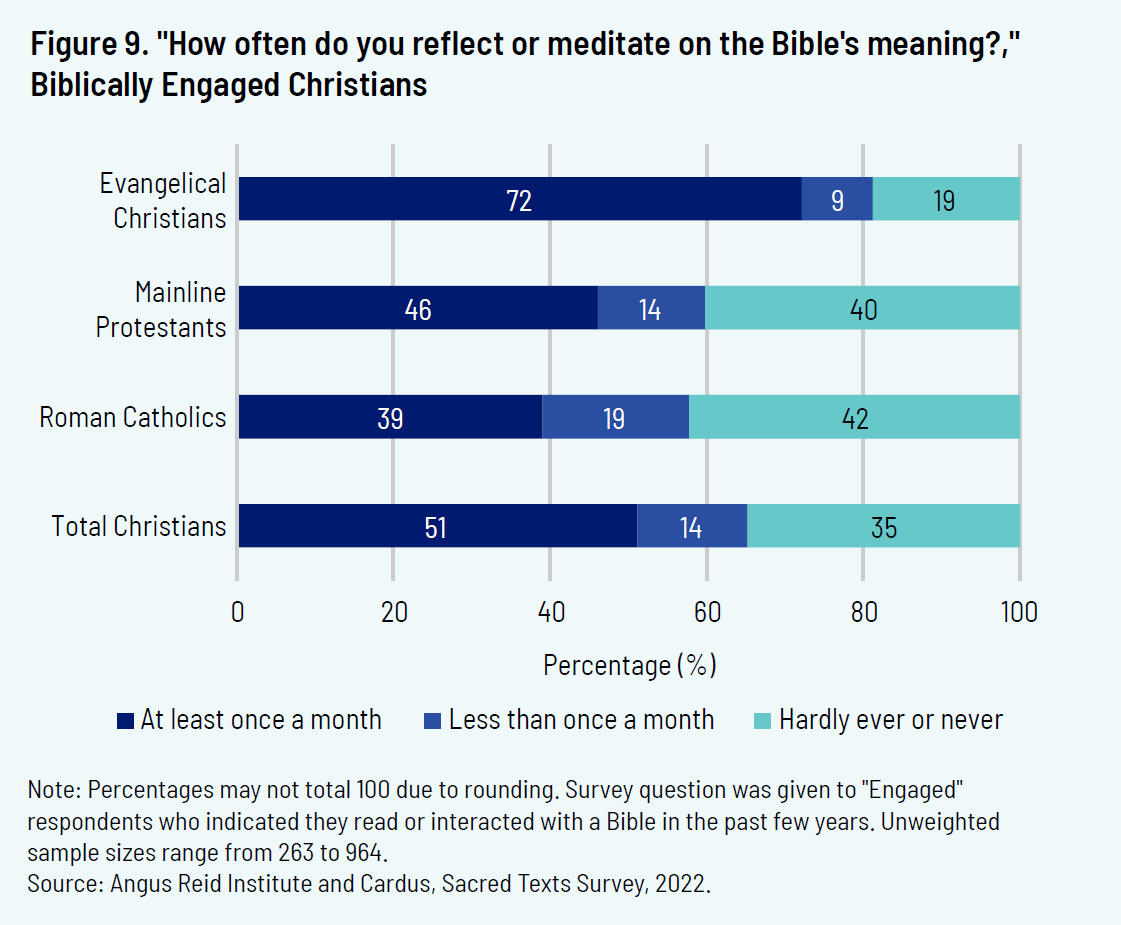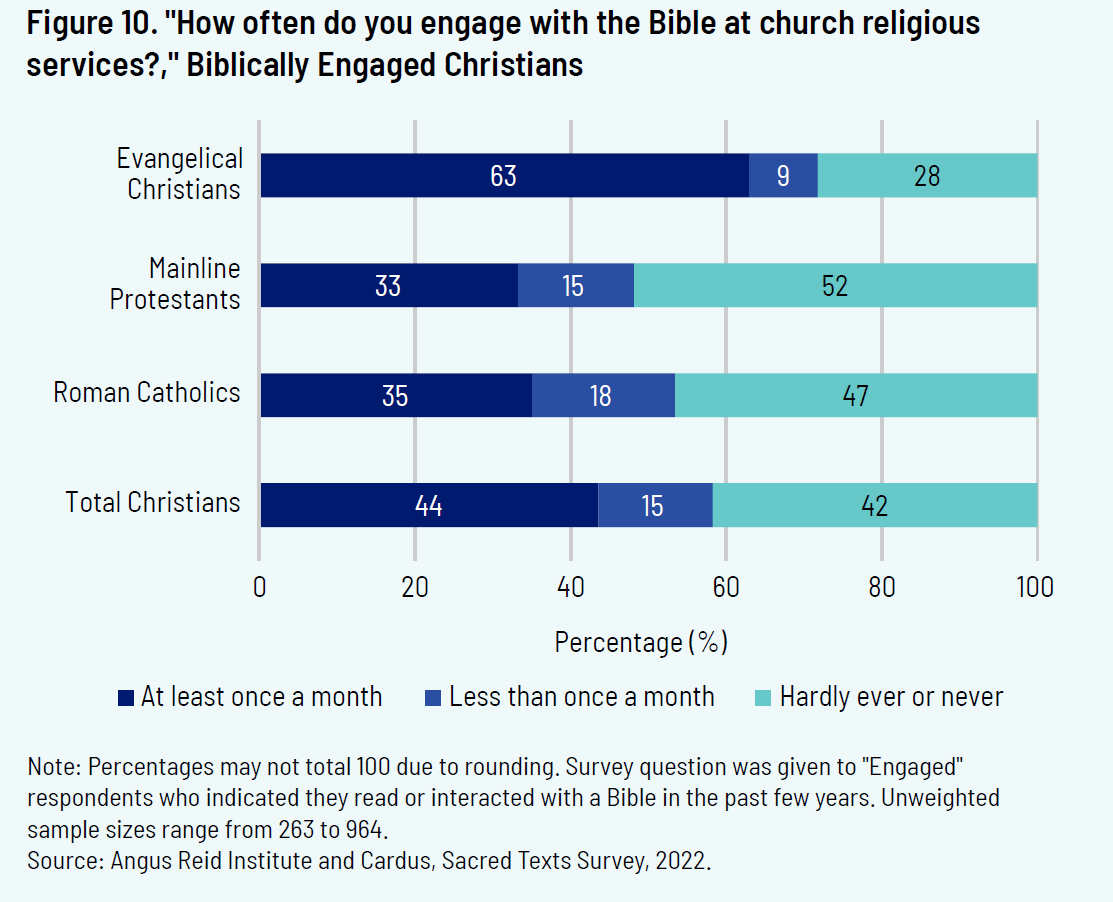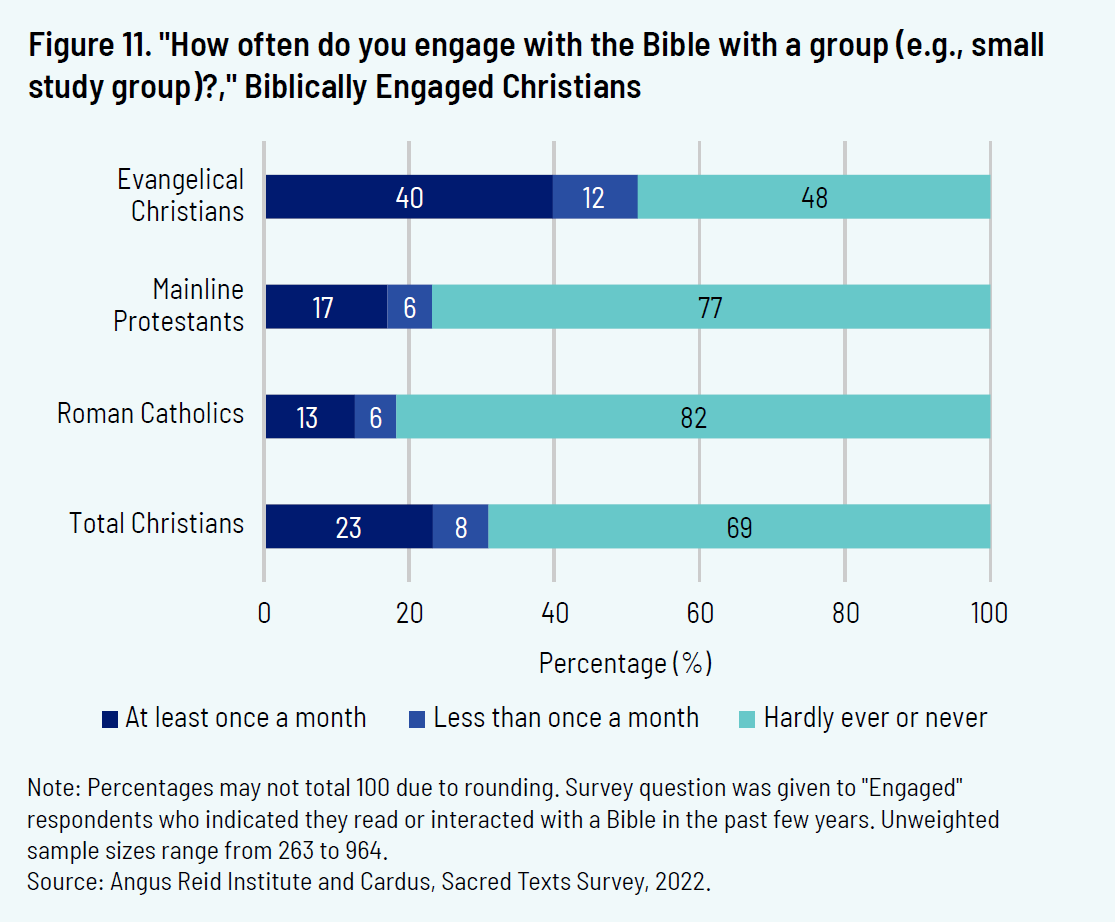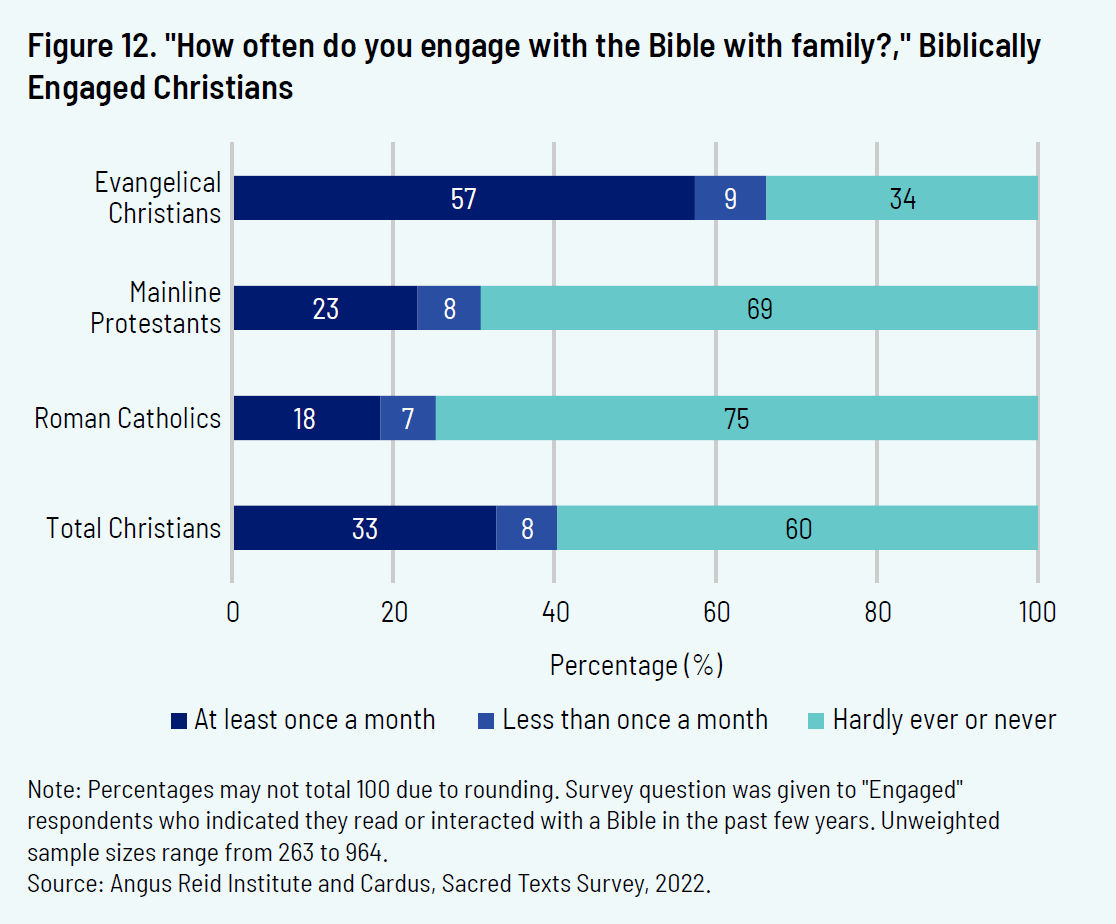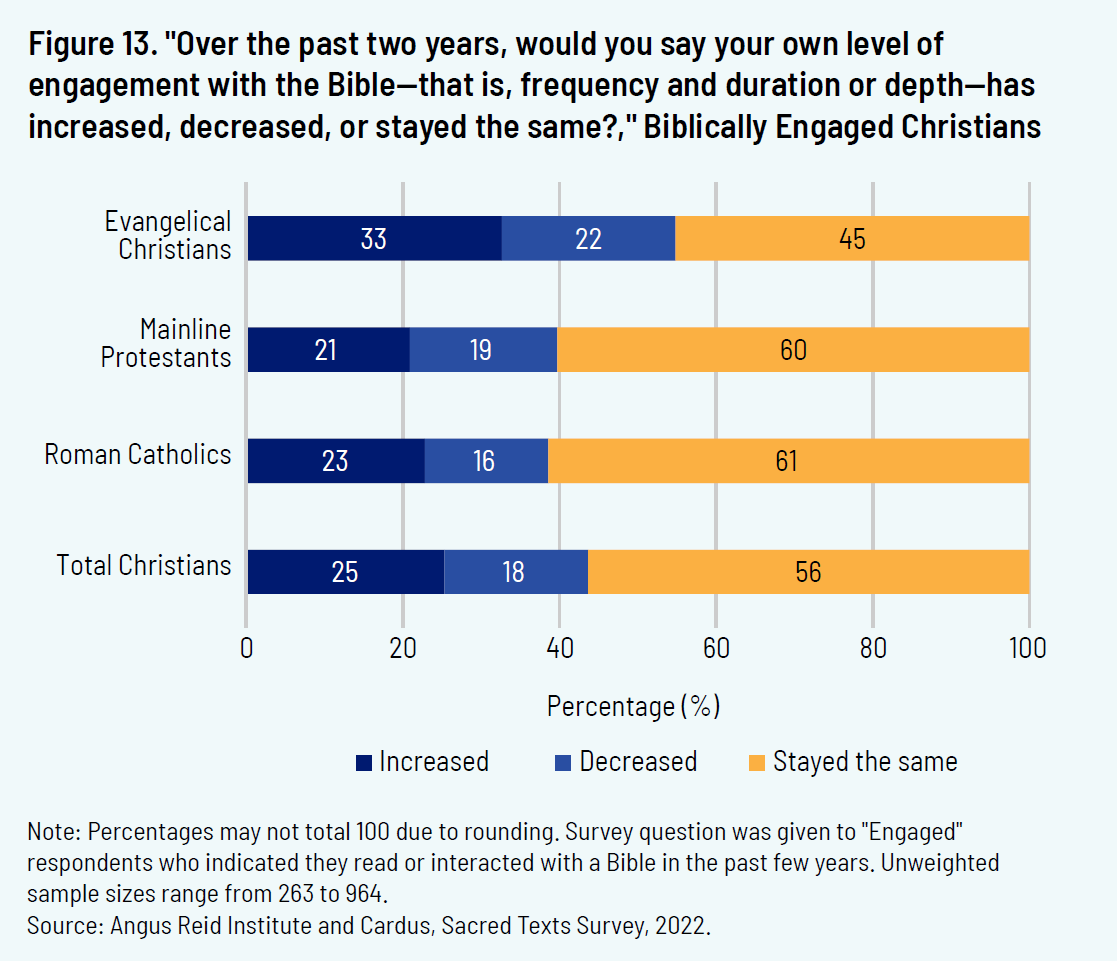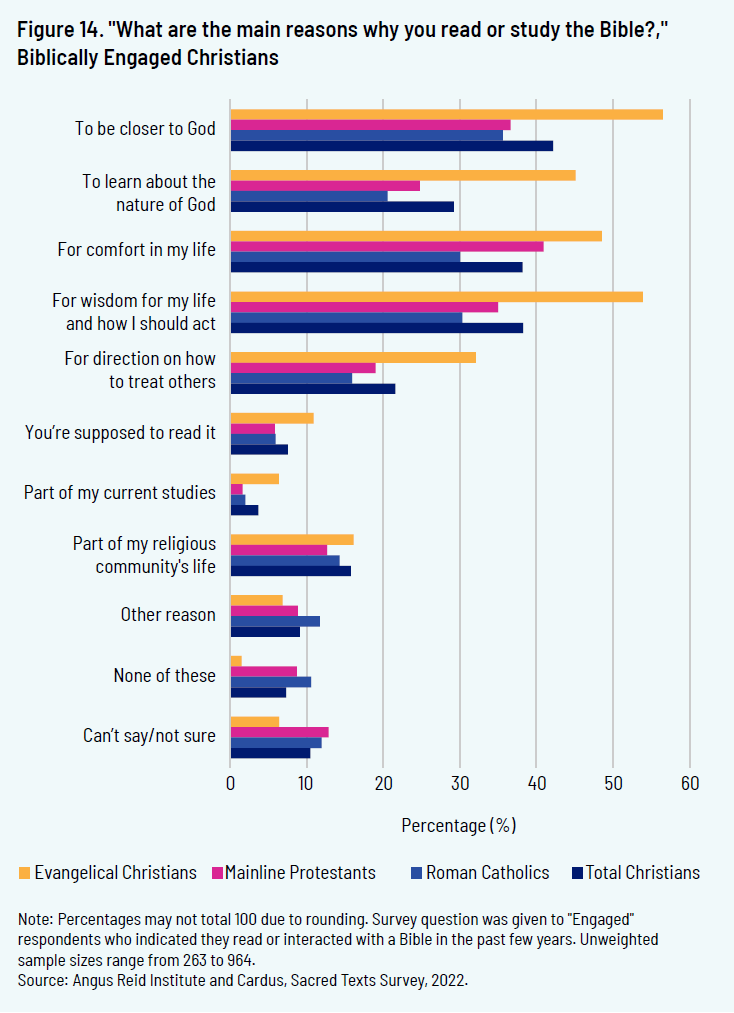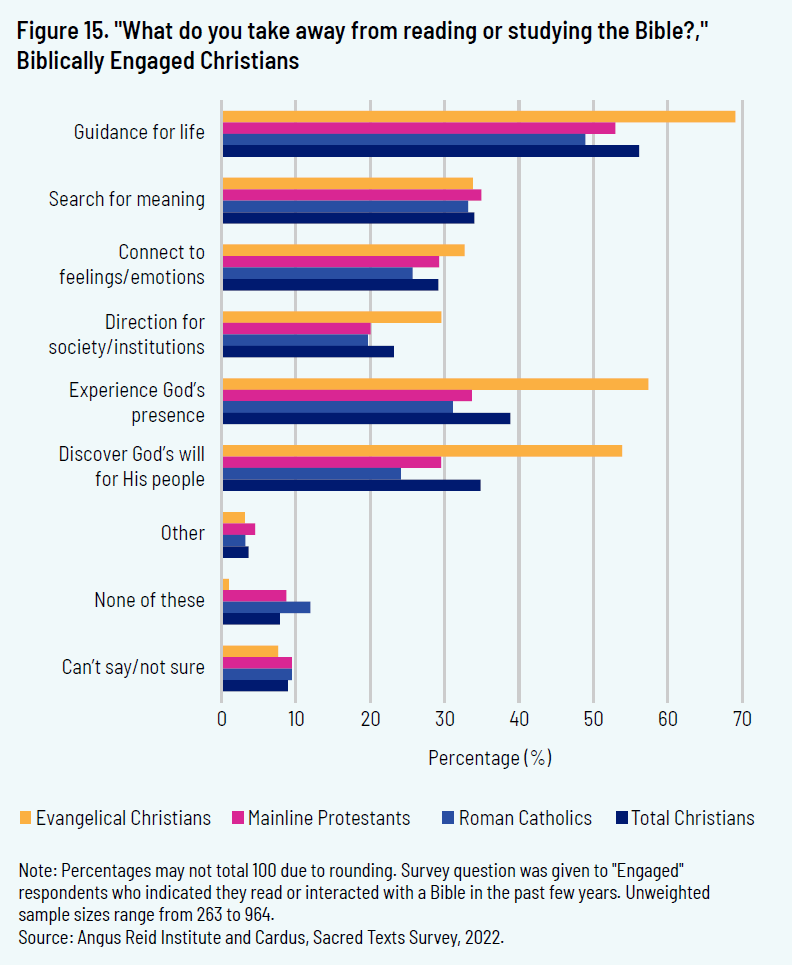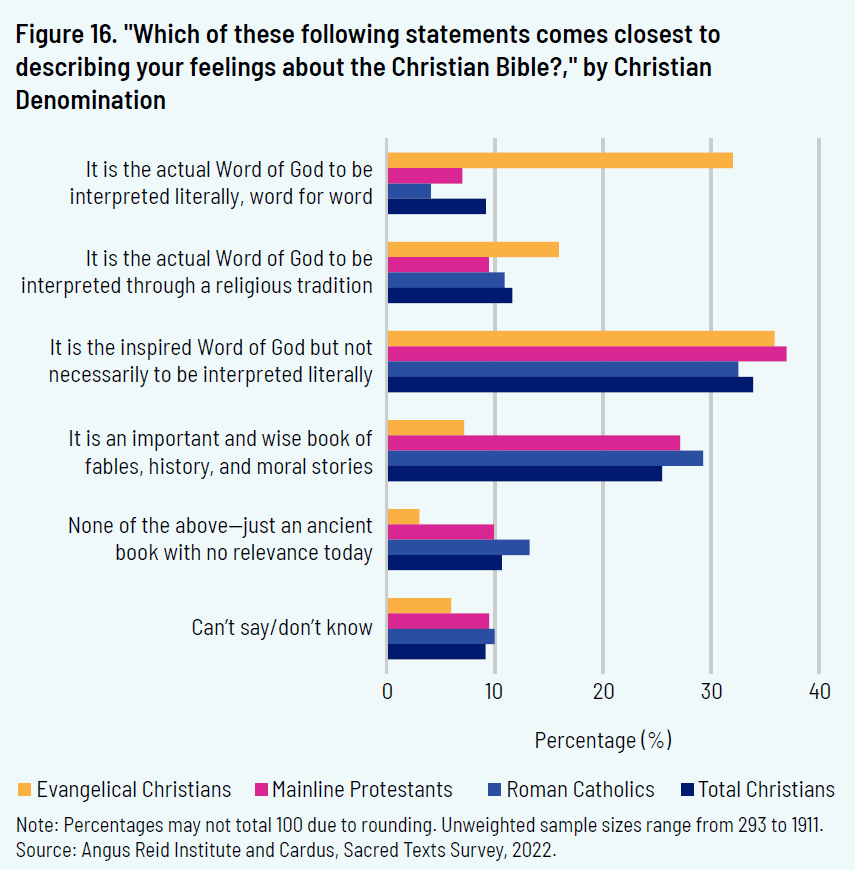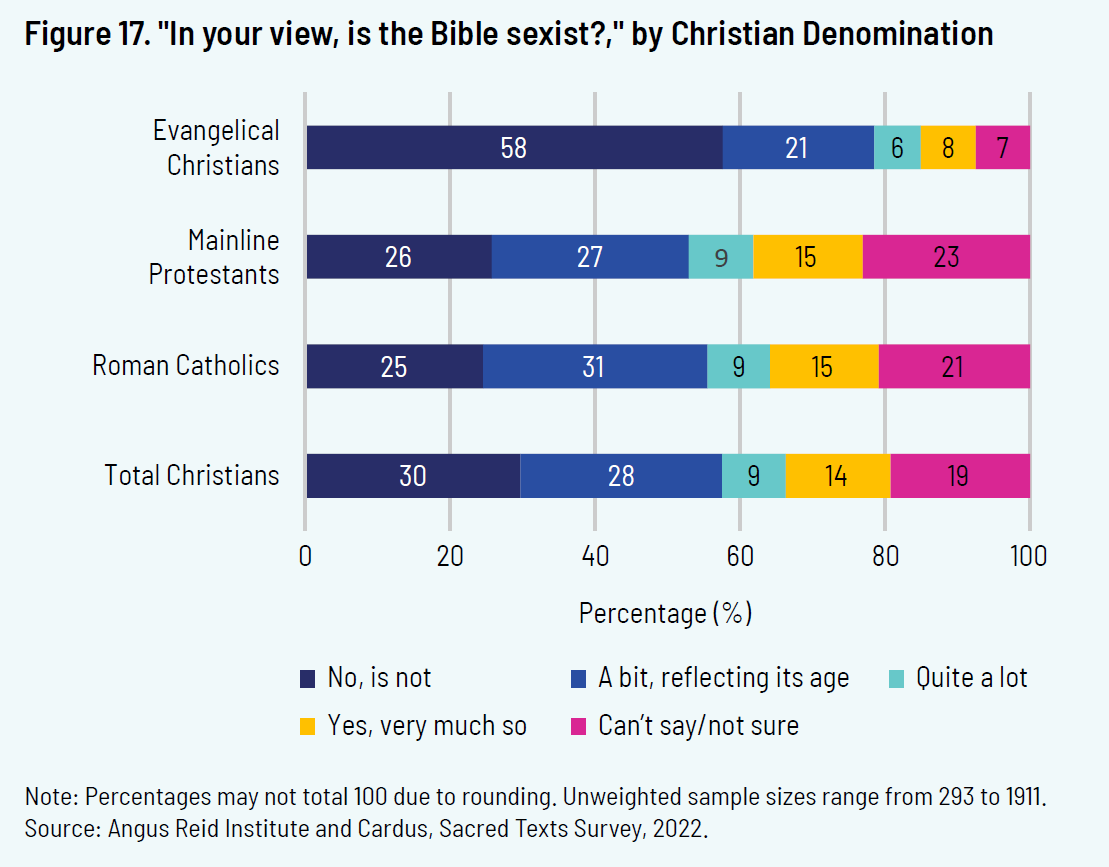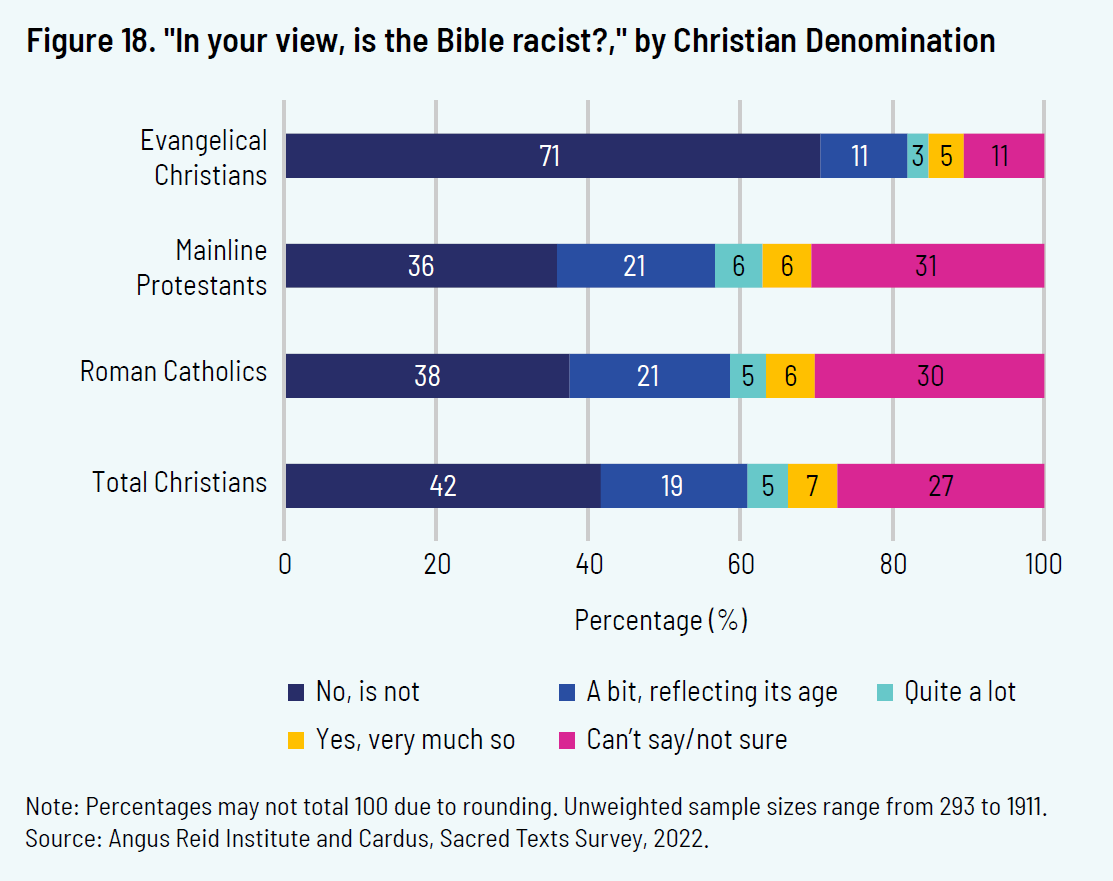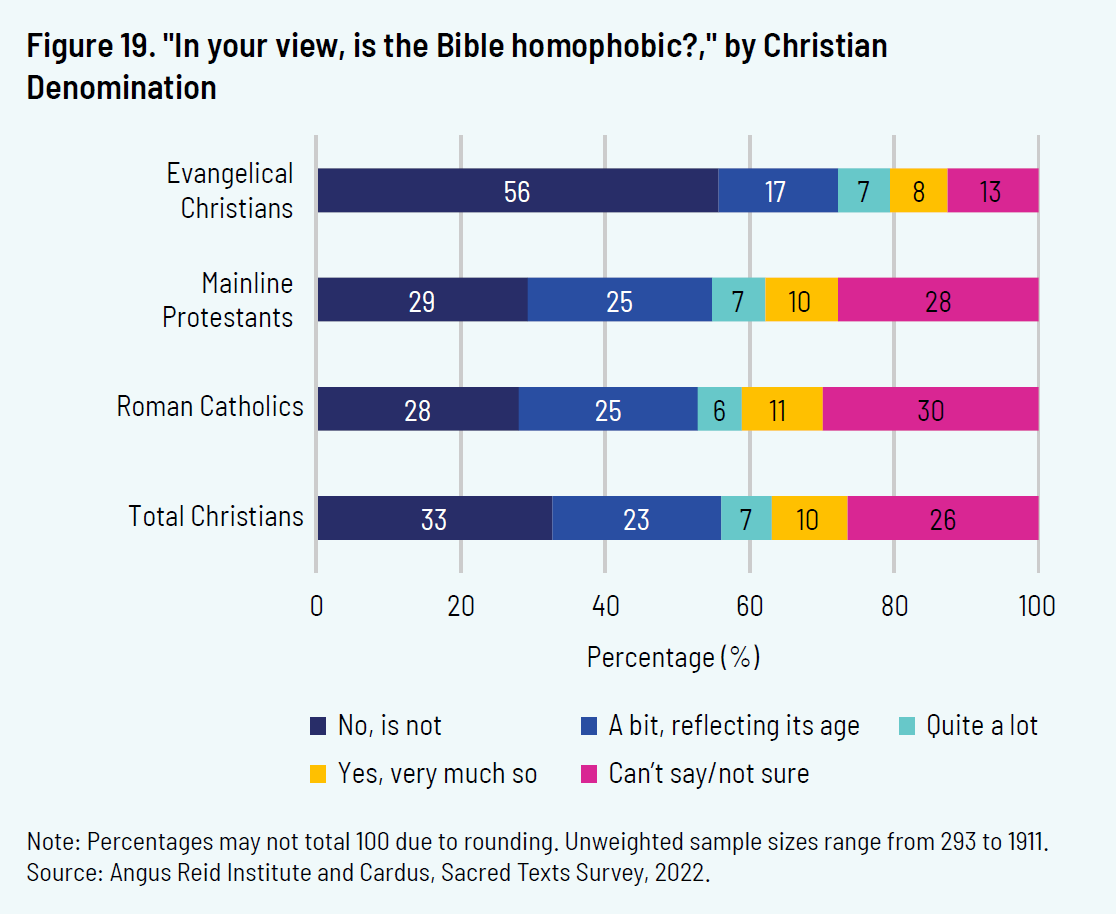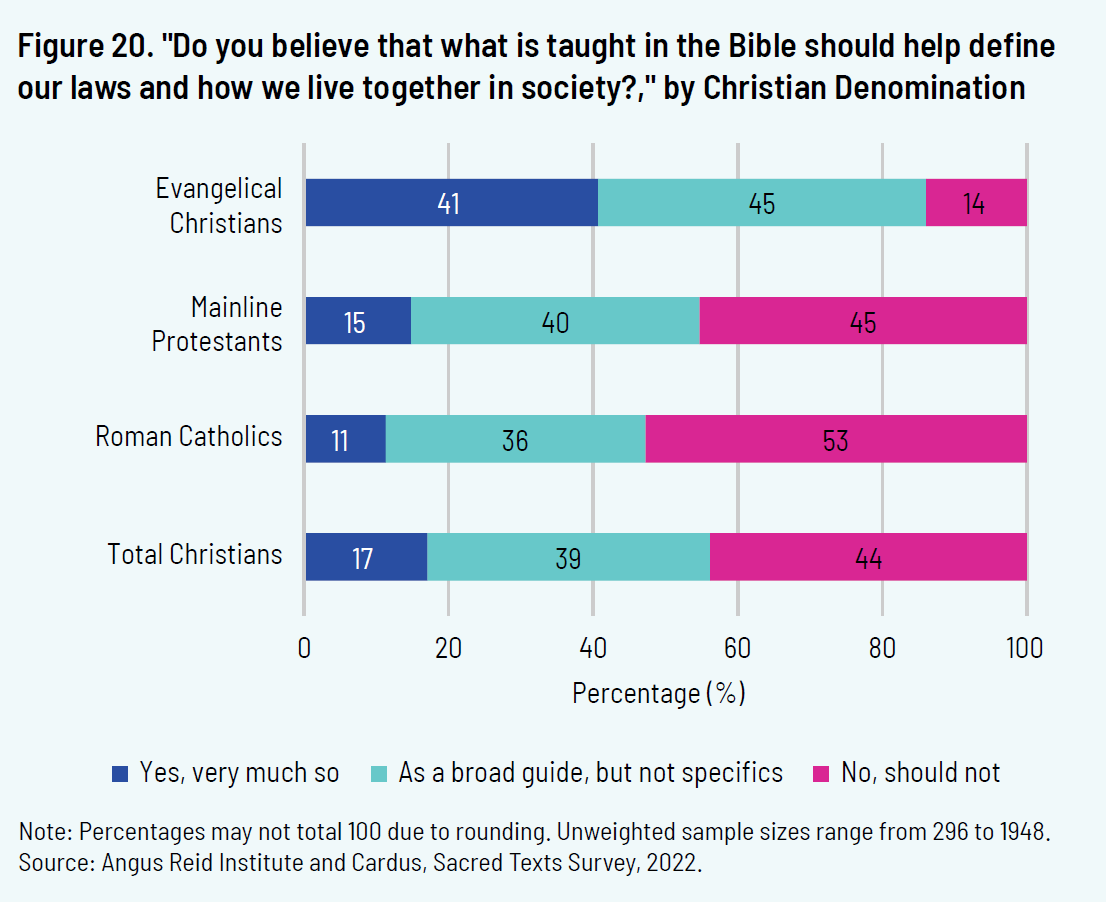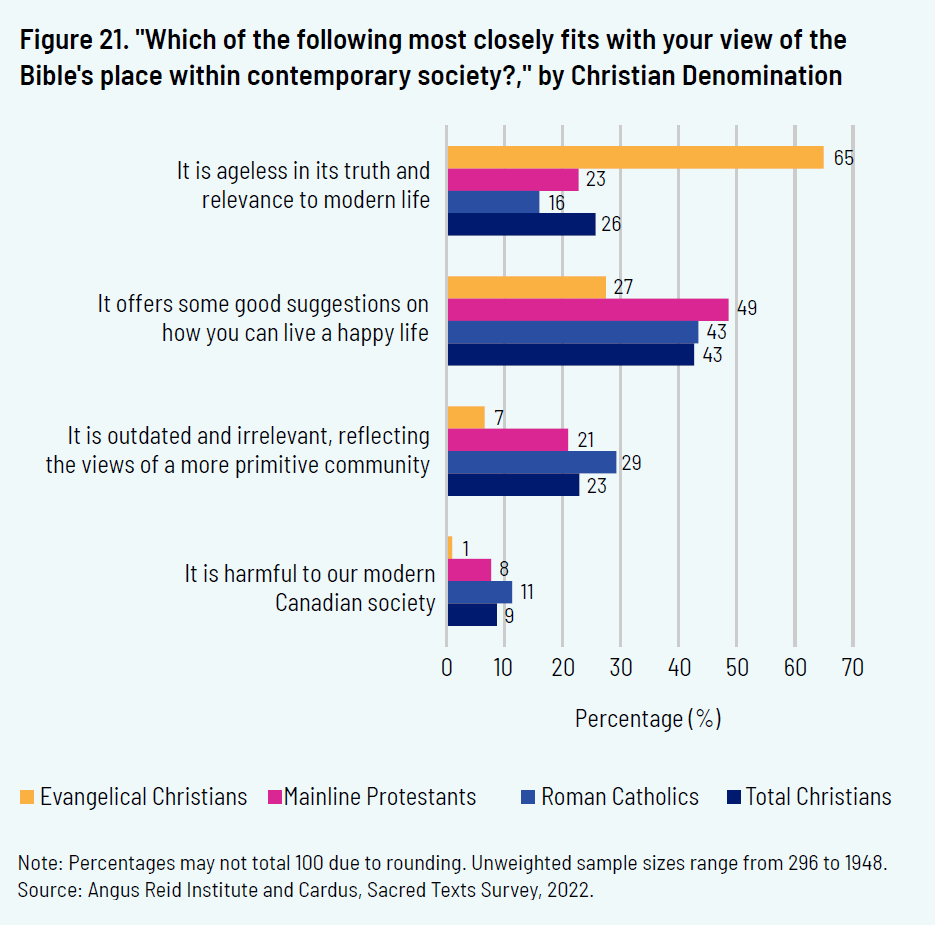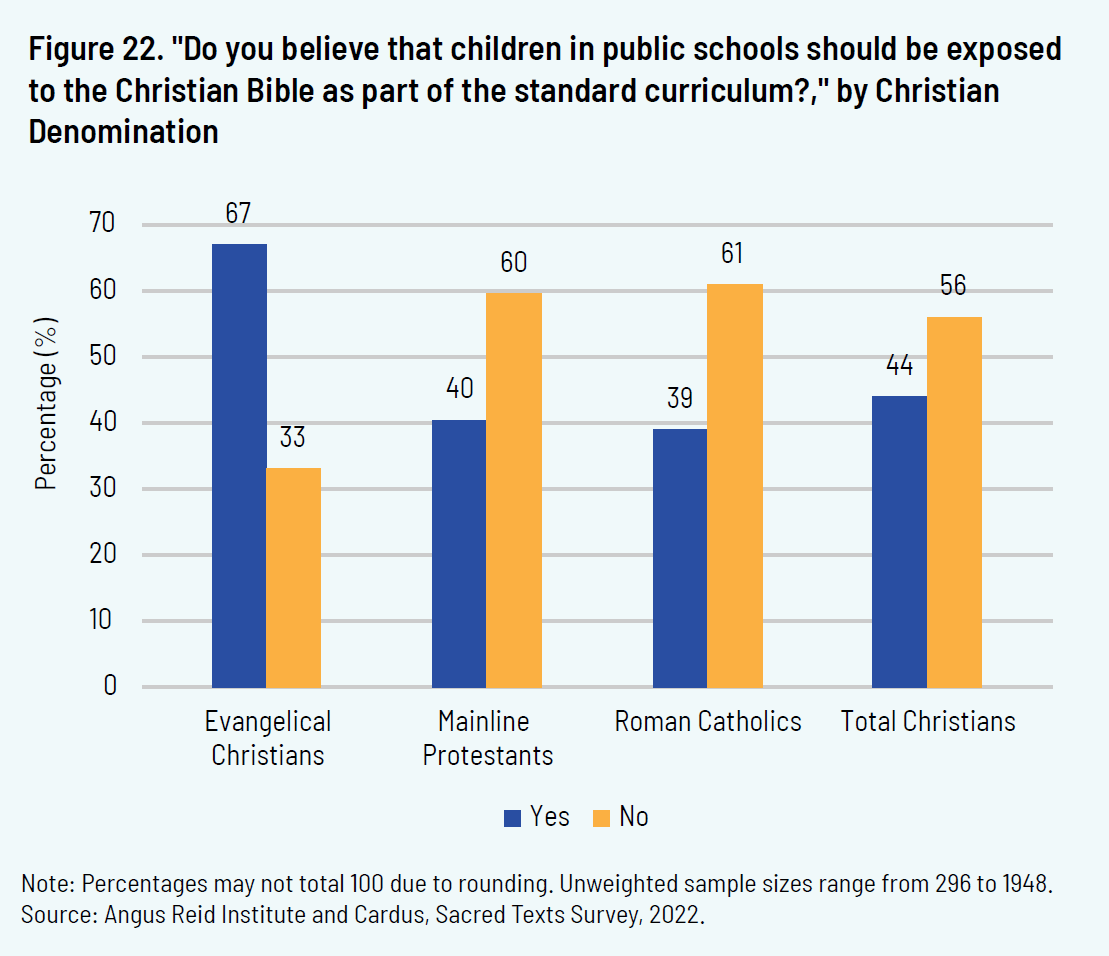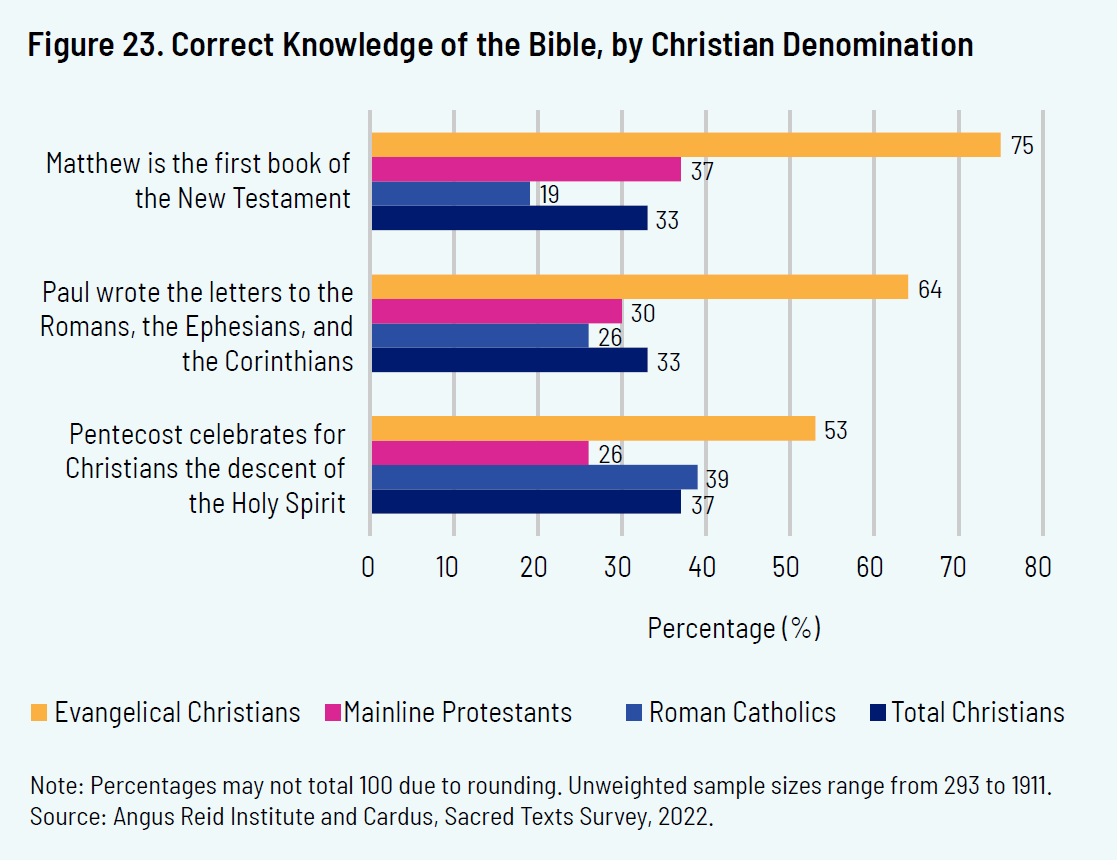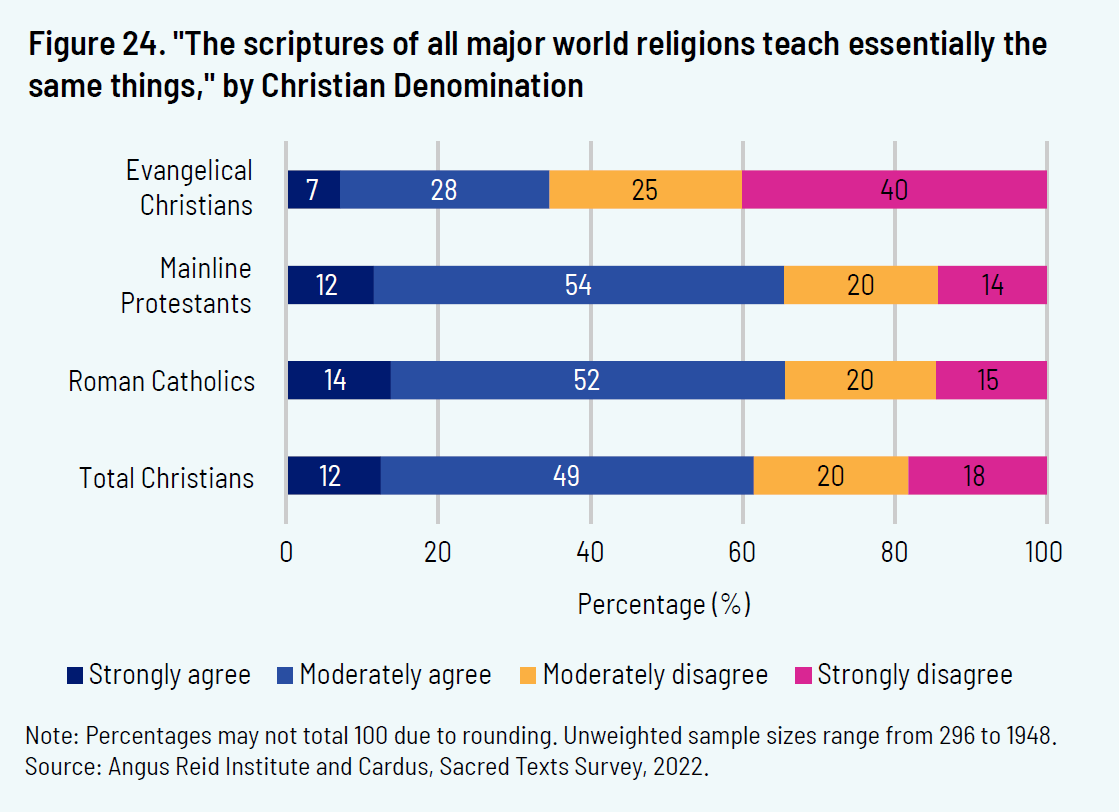Acknowledgement
This report was produced with the generous support of the Canadian Bible Society.
Executive Summary
In the summer of 2022, the Canadian Bible Society supported Cardus to undertake a survey with the Angus Reid Institute to find out how Canadians engage with and understand the sacred texts of Christianity, Judaism, and Islam. The resulting report, “The Sacred Texts: Canadian Perspectives on the Bible, Qu’ran, Torah, and Their Place in Modern Society,” was released in December 2022. This follow-up report now uses the survey data to delve more deeply into the responses of one group of respondents, Canadian Christians, and their engagement with and attitudes toward the Bible specifically.
This paper is organized by a series of overarching thematic questions: How do Canadian Christians read the Bible? Why do they read the Bible? What do they think about the Bible? and Do they know the Bible? At the conclusion of each section, we highlight some of the key challenges and opportunities that we think the survey findings reveal. We then provide some discussion questions to help animate conversations in churches and Christian institutions across the country. A secondary goal of this paper is to inform Canadians in general about how their fellow citizens who identify as Christians engage with the Bible.
The survey shows that there are often significant differences among Christians in how, when, and why they read the Bible. It also reveals that Christians are reading the Bible in different ways, both in terms of reading it in its physical or online form and also in what they understand from their reading. It is those takeaways that often reveal some of the greatest differences among Canadian Christians’ attitudes about the Bible and its role in their lives and in the life of our country.
Introduction
In the summer of 2022, the Canadian Bible Society supported Cardus to undertake a survey with the Angus Reid Institute to find out how Canadians engage with and understand the sacred texts of Christianity, Judaism, and Islam. The resulting report, “The Sacred Texts: Canadian Perspectives on the Bible, Qu’ran, Torah, and Their Place in Modern Society,” was released in December 2022. 1 1 Angus Reid Institute and Cardus, “The Sacred Texts: Canadian Perspectives on the Bible, Qu’ran, Torah, and Their Place in Modern Society,” December 21, 2022, https://angusreid.org/canada-religion-sacred-texts-bible-quran-torah/. This follow-up report now uses the survey data to delve more deeply into the responses of one group of respondents, Canadian Christians, and their engagement with and attitudes toward the Bible specifically.
Much of what we report here was not covered in the earlier paper. Our primary goal is to present the data on Canadian Christians’ use of and perspectives on the Bible, and to contextualize these findings in a useful and applicable way for Christian leaders. We hope that this report offers some high-level observations on these findings that may help these leaders to engage more effectively within their settings and to understand more fully the transmission of the faith today. To that end, at the conclusion of each section we highlight some of the key challenges and opportunities that we think the survey findings reveal. We also provide some discussion questions to help animate conversations in churches and Christian institutions across the country. A secondary goal of this paper is to inform Canadians in general about how their fellow citizens who identify as Christians engage with the Christian Bible.
This paper is organized by a series of overarching thematic questions:
- How do Canadian Christians read the Bible?
- Why do they read the Bible?
- What do they think about the Bible?
- Do they know the Bible?
A Few Words About Methodology
The survey was conducted online from November 22 to 29, 2022, among a representative and randomized sample of 4,016 Canadian adults who are members of the Angus Reid Forum. The group included a general population sample of 3,603 as well as an oversample of 211 respondents who identified as Muslim and 202 respondents who identified as Jews, in order to obtain statistically relevant results for these faith communities that make up 5 percent and just over 1 percent, respectively, of the national population.
For comparison purposes only, a probability sample of this size would have a margin of error of plus or minus 2 percentage points, 19 times out of 20.
In order to determine respondents’ religious identity or lack thereof, the survey presented a list of options and asked respondents to select the one that best described them. The list included the major religious traditions present in Canada as well as the option of “no religious identity” and “other,” with a write-in option. The Christian traditions were presented as follows: “Roman Catholic,” “mainline Protestant (e.g., Anglican, United, Lutheran, Presbyterian),” “Evangelical Christian (e.g., Baptist, Pentecostal, Salvation Army),” and “Orthodox Christian (e.g., Russian, Greek, Ethiopian, Coptic).”
Respondents who selected “mainline Protestant” or “Evangelical Christian” were then presented with a second list of options and asked to select the option that best represented them. This second list included denominations that are often categorized as mainline Protestant and Evangelical Christian. 2 2 For example, see D.M. Haskell, K.N. Flatt, and S. Burgoyne, “Theology Matters: Comparing the Traits of Growing and Declining Mainline Protestant Church Attendees and Clergy,” Review of Religious Research 58, no. 4 (2016): 519, https://doi.org/10.1007/s13644-016-0255-4. This second step enabled us to identify the members of Christian traditions who often are recognized as mainline Protestant but who also identify as Evangelical.
For example, many members of the Anglican Network in Canada identify as Evangelical Christians and as Anglicans, despite the fact that “Anglican” is often classified as a mainline Protestant denomination. 3 3 For more information, see Anglican Network in Canada, “About the Anglican Network in Canada,” https://www.anglicannetwork.ca/aboutus. If a respondent chose “mainline Protestant” in the first round and “Anglican” in the second, we considered them to be mainline Protestant for the purposes of this report. If a respondent selected “Evangelical Christian” in the first round and “Anglican” in the second, we considered them to be Evangelical Christian.
Of the 4,016 adults surveyed, 49 percent identified as Christians. Among this group, about 48 percent (940) identified as Roman Catholic, 30 percent (592) as mainline Protestant, 15 percent (296) as Evangelical, and 6 percent (120) as another Christian denomination, including Orthodox Christians, Latter-day Saints, and Jehovah’s Witnesses. 4 4 Each group was weighted according to the 2011 census, as the 2021 census data was not yet fully available. We grouped Latter-day Saints and Jehovah’s Witnesses within total Christians to follow the same categorization employed by Statistics Canada. See Statistics Canada, “Table 98-10-0342-01: Religion by Visible Minority and Generation Status,” November 2022, https://www150.statcan.gc.ca/t1/tbl1/en/tv.action?pid=9810034201. Respondents who fall within this latter group of Other Christian are not disaggregated in this study due to small sample sizes.
Similar surveys and analyses undertaken in Canada and the United States informed the questions asked in this one. Those we consulted, among others, were the Evangelical Fellowship of Canada’s “Confidence, Conversation and Community: Bible Engagement in Canada, 2013”; Taylor University’s Center for Scripture Engagement’s “Christian Life Survey 2020–2021,” in particular the brief “The Bible Approaches of U.S. Christians” by Steven Bird; and the American Bible Society’s “State of the Bible USA 2021” study.
5
5
For more information, see Evangelical Fellowship of Canada, “Canadian Bible Engagement Study,” May 1, 2014,
https://www.evangelicalfellowship.ca/Communications/Research/Canadian-Bible-Engagement-Study; Center for Scripture Engagement, “The Christian Life Survey,” Taylor University, https://taylor.edu/center-for-scripture-engagement/survey/; L. Cooper et al., “State of the Bible USA 2021,” American Bible Society, 2021, https://1s712.americanbible.org/state-of-the-bible/stateofthebible/State_of_the_bible-2021.pdf.
To assist in question development, Cardus also convened an advisory council of sociologists of religion and theologians from the Roman Catholic, Evangelical, Jewish, and Muslim traditions. The group advised on suggested wording for questions that asked respondents about their engagement with the texts, opinions about them, and knowledge of their content. Cardus approved the final wording of the survey questions in consultation with the Angus Reid Institute.
Key Findings from the Survey as a Whole
Before considering specifically the responses of Canadians who identified as Christians, it is worth considering respondents’ overall engagement with sacred texts across faith traditions. When asked “How often, if at all, do you read the Bible, Qu’ran, or other sacred text?,” 56 percent of respondents said never, 21 percent said rarely, 7 percent said a few times a year, 10 percent said at least monthly but less than daily, and 6 percent reported reading a sacred text daily.
One of the most interesting findings is a possible link between regularly reading sacred texts and engaging in charitable works. The survey found that respondents who had read or engaged with a sacred text in the past few years were more likely to engage in charitable works than respondents who had not. Sixty-eight percent of this group reported that they had donated to a charity in the past few months, compared to 53 percent of those who had not read or engaged with a sacred text in the past few years. Forty-eight percent of this “biblically engaged” group had volunteered their time in the past few months, compared to 33 percent of those not engaged. And 65 percent of the “biblically engaged” had helped a stranger in need in the past few months, compared to 51 percent of those not engaged.
The survey asked several questions about participants’ engagement with the sacred text of their own faith tradition. For the remainder of this report, we focus solely on those respondents who self-identified as Christians.
How Do Canadian Christians Read the Bible?
“When, if ever, was the last time you read or engaged with the Bible?”
When asked whether they had read or engaged with the Bible in the past few years or twelve months, 90 percent of Evangelicals said yes, while only 48 percent of mainline Protestants and 38 percent of Roman Catholics said the same. In this report, we refer to these respondents as “biblically engaged” Christians.
If respondents said that they had not engaged with or read the Bible in the past year, we asked them when, if ever, they had done so. Of Evangelicals, 28 percent reported that they have never read or engaged with the Bible, or have not done so since their childhood or when in school. Fifty-one percent of mainline Protestants said the same, and for Roman Catholics, the figure was 59 percent.
“Do you have a physical copy, that is, in traditional book form, of the Bible in your home?”
Sixty-five percent of respondents reported that they have a physical copy of the Bible at home. When broken down into the three traditions, 93 percent of Evangelicals, 72 percent of mainline Protestants, and 52 percent of Roman Catholics reported having a Bible in book form at home.
“How often, if ever, do you read your home copy of the Bible?”
The table below presents the full results for this question. Of greatest interest is that among those who reported having a physical copy of the Bible in their home, a substantial majority, 63 percent, reported that they never or hardly ever read it. Three percent reported that they read it once a month, and 8 percent that they read it every day.
The frequency with which Christians read their copy of the Bible at home varies considerably across Christian traditions, with 22 percent of Evangelicals reporting that they are daily readers, 10 percent reading it once per week, and 20 percent reporting that they read it several times a week. The corresponding figures for Roman Catholics are very different, with just 3 percent being daily readers, 3 percent reading a few times a week, and 2 percent reading once a week. For mainline Protestants the corresponding figures are 6 percent, 4 percent, and 3 percent.
A full 76 percent of Roman Catholics reported that they never or hardly ever read their copy of the Bible at home. For mainline Protestants the figure is 70 percent, and for Evangelicals it is 32 percent.
“When you read or engage with the Bible these days, how often is it in paper versus digital form?”
Some significant differences emerged among “biblically engaged” respondents of the various Christian traditions when they were asked about accessing the Bible through digital means. Evangelicals are the most likely to read the Bible digitally, with 26 percent reporting that they read it in digital form always or usually, and 56 percent reporting that they always or usually read it in book form. A substantial majority of Roman Catholics, 71 percent, reported that they always or usually read the Bible in book form; for mainline Protestants the figure is similar, at 68 percent. Only 15 percent of Roman Catholics and 17 percent of mainline Protestants responded that they always or usually read the Bible digitally.
When asked whether they listened to audio versions of the Bible, 25 percent of Evangelicals said yes, but only 12 percent of mainline Protestants and 10 percent of Roman Catholics said the same.
“How often do you engage with the Bible on your own or by yourself?”
Having ascertained how often respondents read the Bible, we wanted to learn more specifically about the contexts in which they read it. We wanted to learn how often “biblically engaged” Christians are reading the Bible on their own, in small groups, or in church.
When asked how often they read the Bible on their own, 35 percent of Roman Catholics reported that they do so at least once a month, 5 percent of whom do so daily. Fifty-one percent of Roman Catholics indicated that they never or hardly ever read the Bible on their own.
The corresponding figures for Evangelicals are that 73 percent read their Bible at least once a month, with 29 percent of that 73 percent reading it daily. Twenty percent of Evangelicals never or hardly ever read their Bible by themselves.
The mainline Protestants’ personal Bible reading aligns more closely with that of Roman Catholics, yet more than double the number, 12 percent, read the Bible on their own on a daily basis.
Interestingly, when asked whether they take time to meditate or reflect on the meaning of Scripture, nearly the same number of Roman Catholics and mainline Protestants, 9 percent and 10 percent, said they do so on a daily basis. How long do they typically read? Among those who read their Bible on their own, Roman Catholics spend as much time as Evangelicals, about seventeen minutes on average. Mainline Protestants are not that far behind, at about fifteen and a half minutes.
“How often do you engage the Bible at church services?”
We asked the “biblically engaged” respondents about engaging the Bible during communal worship or Mass. Thirty-five percent of Roman Catholics reported doing this at least once a month, including 20 percent on a weekly basis. The corresponding figure for Evangelicals who engaged the Bible at church was 63 percent, and for mainline Protestants, 33 percent.
If we compare the frequency of engaging with the Bible in church services to the frequency of engaging with it on one’s own, there is virtually no difference between Roman Catholics and mainline Protestants: each reported that they dedicate roughly equal amounts of time at least once a month to engaging Scripture in church and to private reading. A higher number of Evangelicals (73 percent) read their Bible on their own at least once a month compared to engaging it in church (63 percent). But do these differences hold when we examine the data on how often Christians of different traditions read Scripture together outside of church?
“How often do you engage the Bible with a group, such as a small study group?”
When asked how often they read or engaged with the Bible with a group such as a small study group, there were substantial differences among “biblically engaged” Evangelicals, mainline Protestants, and Roman Catholics. Evangelicals are most likely to engage Scripture in such gatherings, with 40 percent responding that they do so at least once a month, and 27 percent of this 40 percent engaging in this activity at least once a week. Roman Catholics and mainline Protestants are less likely to engage the Bible in a group setting, with 13 percent and 17 percent, respectively, doing so at least once a month.
“How often do you engage the Bible with family?”
When “biblically engaged” respondents were asked how often they engage with the Bible with family, 57 percent of Evangelicals responded that they do so at least once a month, and 10 percent of this 57 percent do so daily. Twenty-three percent of mainline Protestants said that they engage with the Bible with family at least once a month, with 5 percent of this 23 percent engaging it with their families daily. Among Roman Catholic respondents, there is less engagement with the Bible in family settings, with just 18 percent doing so at least once a month and only 2 percent of this 18 percent doing so on a daily basis.
“Over the past two years, would you say your own level of engagement with the Bible—that is, frequency and duration or depth—has increased, decreased, or stayed about the same?”
We asked the “biblically engaged” respondents how their level of engagement had changed, if at all, over the past two years—a timeframe covering much of the COVID-19 pandemic. While a plurality of Evangelicals and a majority of both Roman Catholics and mainline Protestants indicated that their level of engagement has stayed the same, within each tradition the number that said it has increased was greater than the number who said it has decreased. Twenty-three percent of Roman Catholics, 33 percent of Evangelicals, and 21 percent of mainline Protestants reported an increased level of engagement with the Bible during this time.
Challenges and Opportunities
- Barely half of Roman Catholics reported having a physical copy of the Bible at home, and of those, fewer than one in five read it at least once a month.
- Of the Christians who indicated that they have a Bible in their home, nearly two-thirds said that they never or hardly ever read it. One quarter of “biblically engaged” Evangelicals always or usually read the Bible in digital form.
- Just over one third of “biblically engaged” Roman Catholics read or interact with the Bible on their own at least once a month.
- When Christians across the spectrum of traditions sit down with the Bible on their own, they are spending an average of seventeen minutes reading.
For Discussion
- These findings raise the question of whether there are significant differences among Christian denominations in how their members engage the Bible in certain contexts.
- Among “biblically engaged” Christians, about 25 percent engaged with the Bible more over the past two years. What might the reasons be for this increase? Are there particular cultural or societal factors at work? Are there new initiatives within congregations, or more broadly in denominations, that are encouraging this?
- How do Christian leaders encourage people to read the Scriptures? How do pastors encourage more intentional discipleship training and emphasis on Bible reading?
- Roman Catholics are more likely to engage with the Bible at least once a month at Mass than through small groups or with family. Does this context of engagement have an impact on Roman Catholics’ biblical literacy? How might the Catholic Church work with groups such as the Canadian Bible Society to enhance the laity’s engagement with Scripture?
Why Do Christians Read the Bible?
Having surveyed how Christians read the Bible and the different ways in which they engage with it, for how long, and how frequently, the survey moved on to examine the reasons that they read the Bible. Together with questions that explored what they think of the Bible, these next questions offer insight into the attitudes of Canadians who identify as Christians.
“What are the main reasons why you read or study the Bible?”
When asked why they read or study the Bible, the most common responses among “biblically engaged” Christians as a whole were “for comfort in my life” (38 percent), “to be closer to God” (42 percent), and “for wisdom for my life and how I should act” (38 percent). Respondents could select more than one answer. Across Christian traditions, the most frequently cited reason for reading the Bible was “to be closer to God,” with 36 percent of Roman Catholics, 37 percent of mainline Protestants, and 56 percent of Evangelicals selecting this response option. Evangelicals were far more likely to read the Bible “to learn how to treat others” (32 percent) than were Roman Catholics (16 percent) or mainline Protestants (19 percent).
“What do you take away from reading or studying the Bible?”
The survey asked “biblically engaged” Christians what they take away from reading or studying the Bible. Respondents could select more than one answer. Among “biblically engaged” Christians, 56 percent cited “guidance for life,” 39 percent “experiencing God’s presence,” and 35 percent “discovering God’s will for his people.” The most commonly selected response was “receiving guidance for life,” at 69 percent of Evangelicals, 53 percent of mainline Protestants, and 49 percent of Roman Catholics. A higher percentage of Evangelicals selected “experiencing God’s presence” and “discovering God’s will for his people” compared to mainline Protestants or Roman Catholics.
Challenges and Opportunities
- There is a difference between Evangelicals on the one hand and Roman Catholics and mainline Protestants on the other, concerning whether a significant takeaway of reading the Bible is to discover God’s will for his people.
- The reason for reading the Bible that was cited most frequently by “biblically engaged” Christians was “to be closer to God.”
For Discussion
- Why is there a disparity between how Evangelicals and other Christians engage the Bible?
- Are there new possibilities for ecumenical dialogue, given that Christians across the denominations share many reasons for reading Scripture?
- How can Christians from within their different traditions discern the will of God? What can we learn from one another?
What Do Christians Think About the Bible?
Some of the more interesting results from the survey relate to perceptions of the Bible and specifically how Christians perceive it in relation to concerns about racism, sexism, and homophobia. In this section we report the responses of all those who identified as Christian, regardless of whether they had engaged with the Bible in the past few years.
“Which of these following statements comes closest to describing your feelings about the Christian Bible?”
When presented with five statements describing the Bible, the greatest number of respondents, 34 percent, selected that “it is the inspired Word of God but not necessarily to be interpreted literally.” The next largest number, at 25 percent, selected that the Bible “is an important and wise book of fables, history, and moral stories.” Relatively small numbers of respondents said that the Bible “is the actual Word of God to be interpreted through a religious tradition” or that “it is the actual Word of God to be interpreted literally, word for word,” at 12 percent and 9 percent, respectively.
When we examine the responses by Christian tradition, there are relatively similar numbers of Roman Catholics (33 percent), Evangelicals (36 percent), and mainline Protestants (37 percent) who affirm that the Bible “is the inspired Word of God but not necessarily to be interpreted literally.” Indeed, the largest number of both Roman Catholics and mainline Protestants hold to this view. Evangelicals’ second most-affirmed view, at 32 percent, is that the Bible “is the actual Word of God to be interpreted literally, word for word.” Only 4 percent of Roman Catholics and 7 percent of mainline Protestants selected this response option.
Another important finding is that 13 percent of Roman Catholic respondents said that the Bible is not the Word of God but is instead “an ancient book with no relevance today.” Ten percent of mainline Protestants and 3 percent of Evangelicals held this view.
“In your view is the Bible sexist, racist, or homophobic?”
When asked whether the Bible is sexist, 23 percent of respondents selected either “yes, very much so” or “quite a lot.” Twenty-four percent of Roman Catholics and mainline Protestants responded in this way, and 14 percent of Evangelicals did so.
On the question of whether the Bible is racist, 61 percent of respondents selected either “no, it is not” or “a bit, reflecting its age,” and 12 percent selected either “yes, very much so” or “quite a lot.” Slightly fewer Roman Catholics and mainline Protestants, at 59 percent and 57 percent, responded in this way. A large majority of Evangelicals, at 82 percent, selected this option. However, a relatively large number of respondents are uncertain of their view on this question, with 30 percent of Roman Catholics and 31 percent of mainline Protestants responding with “can’t say or unsure.”
Is the Bible homophobic? On this question, there was again divergence among respondents. Seventy-three percent of Evangelicals selected “no, it is not” or “a bit, reflecting its age,” while 53 percent of Roman Catholics and 54 percent of mainline Protestants selected one of these response options. However, as with the question of whether the Bible is racist, whether it is homophobic is up for debate: 30 percent of Roman Catholics and 28 percent of mainline Protestants responded with “can’t say or unsure.”
“Do you believe that what is taught in the Bible should help define our laws and how we live together in society?”
When it comes to Canadian Christians’ views on how the Bible should relate to our society, there are some striking divergences among respondents.
Forty-one percent of Evangelicals said that what the Bible teaches should “very much” define our laws and how we live together, whereas only 11 percent of Roman Catholics and 15 percent of mainline Protestants said so. Indeed, a majority of Roman Catholics, 53 percent, and about 45 percent of mainline Protestants said that the Bible should not define our laws or shape our common life.
“Which of the following most closely fits with your view of the Bible’s place within contemporary society?”
Respondents also held divergent opinions on the question of the Bible’s place in Canada today. A clear majority of Evangelicals, 65 percent, held that the Bible “is ageless in its truth and relevance to modern life.” This is in contrast to 41 percent of Roman Catholics, who selected the response options that the Bible “is outdated and irrelevant, reflecting the views of a more primitive community” or “is harmful to our modern Canadian society.” Twenty-nine percent of mainline Protestants selected one or other of these positions.
“Do you believe that children in public schools should be exposed to the Christian Bible as part of the standard curriculum?”
The divergence between Evangelicals on the one hand and Roman Catholic and mainline Protestants on the other continues when asked whether the Bible should be discussed in public schools. A clear majority of Evangelicals, 67 percent, said yes, whereas clear majorities of Roman Catholics and mainline Protestants, at 60 percent and 61 percent, respectively, said no.
On the question of whether students should be exposed to other sacred texts, such as the Qu’ran, in public schools, 77 percent of all Christian respondents said no.
Challenges and Opportunities
- There is a substantial difference between Roman Catholics and mainline Protestants on the one hand and Evangelicals on the other on whether the Bible is “the actual Word of God to be interpreted literally.” More than four times as many Evangelicals as Roman Catholics and mainline Protestants agreed with the statement.
- Thirteen percent of Roman Catholics think that the Bible is “an ancient book with no relevance today in contemporary society.” On a similar question relating to how the Bible fits within society, 41 percent of Roman Catholics responded that the Bible is either “irrelevant, reflecting more primitive views,” or is actually “harmful to Canadian society.”
- Roman Catholics and Evangelicals also differ on whether the Bible should define how we live together, with four times as many Evangelicals as Roman Catholics agreeing that the teachings of the Bible should help to define our laws and societal life.
- Nearly one third of mainline Protestants and Roman Catholics are unsure whether the Bible is racist or homophobic.
For Discussion
- One third of Roman Catholics and mainline Protestants say they are unsure of whether the Bible is racist or homophobic. What is the reason for this uncertainty? How do the views of these Christians adhere to or diverge from their own church or denomination’s teachings on these matters? If there is a divergence, what might be the cause of it?
- Why is there a difference of opinion among Christians on the application of Christian belief to the Canadian public square? Is there a gap in common discipleship, teaching, and preaching that is not informing the faithful of the importance of speaking in the public square?
- If some Christians believe that the Bible should not guide our common life together, what other sources do they think should guide?
- Has the Christian faith become for many a private matter that has little bearing on our public lives? If so, what might be the reasons? What can the Bible teach us about living a public faith?
Do Christians Know the Bible?
How well do Christians know what is in the Bible? The following content-based questions were posed as part of the survey.
“What does Pentecost celebrate for Christians?”
The descent of the Holy Spirit upon the apostles on the day of Pentecost and the birth of the church as described in Acts 2 is one of the central events recounted in the New Testament. Respondents could choose from four possible answers: 1) the descent of the Holy Spirit, 2) the resurrection of Jesus Christ, 3) the birth of Jesus Christ, and 4) the coming of spring and greater daylight. A minority of Christians, 37 percent, selected the correct answer. When disaggregated, a slight majority of Evangelicals, 53 percent, answered correctly, and 26 percent of mainline Protestants and 39 percent of Roman Catholics did the same.
“Who wrote the letters to the Romans, the Ephesians, and the Corinthians?”
These letters of the apostle Paul to these early Christian communities are some of the most widely cited and read books of the New Testament after the four Gospels. Respondents were asked to write in what they believed to be the correct answer. Only 33 percent of Christian respondents were able to name Paul as the author. When disaggregated, a clear majority of Evangelicals, 64 percent, gave the correct response, while only 26 percent of Roman Catholics and 30 percent of mainline Protestants responded correctly.
“What is the name of the first book of the New Testament?”
In every Christian Bible, the Gospel of Matthew appears as the first book. For this write-in response, only about one-third of respondents gave the correct answer. Again, a clear majority of Evangelicals, at 75 percent, answered correctly. Nearly two in five mainline Protestants, 37 percent, gave Matthew as their answer. Only about one in five Roman Catholics, 19 percent, answered correctly.
“The scriptures of all major world religions teach essentially the same things.”
The survey asked respondents about their level of agreement with this statement. A clear majority of respondents, 61 percent, either strongly or moderately agreed. Two-thirds of Roman Catholics and mainline Protestants either strongly or moderately agreed. Two-thirds of Evangelicals either strongly or moderately disagreed.
The Christian faith teaches that God became incarnate in the God-Man Jesus Christ, that he preached the gospel while healing the sick, restoring sight to the blind, and raising the dead, and, that he suffered, died, and rose from the dead on the third day for the salvation of the world. The incarnation and the resurrection are central teachings of the Christian faith as revealed in the New and the Old Testaments. They are not part of any other religious tradition nor any other religion’s sacred text. This fact stands in bold contrast to the beliefs of Christians revealed by the responses to this question.
Challenges and Opportunities
- A clear majority of Christians believe that the teachings of the Bible are essentially the same as the teachings of other religions’ sacred texts.
- The majority of Roman Catholics, and to a slightly lesser extent mainline Protestants, believe that the Bible is not substantially different from other scriptures in what it teaches.
- Most Evangelicals view the Bible as different from other sacred texts in what it teaches; this finding suggests a greater degree of biblical literacy and comprehension of what the New Testament in particular teaches.
For Discussion
- The survey reveals that those who identify as Christians have diverse views on what the Bible is and the role it plays in their lives. What does it mean to call oneself a Christian today?
- How might approaches to Christian education or formation change, to address current realities?
- The survey reveals that a majority of Christian respondents believe that all sacred texts teach essentially the same thing. What can pastorals and other Christian leaders do to connect the dots between what we believe as Christians and what the Bible reveals about God?
References
Anglican Network in Canada. “About the Anglican Network in Canada.” https://www.anglicannetwork.ca/aboutus.
Angus Reid Institute. “The Sacred Texts: Canadian Perspectives on the Bible, Qu’ran, Torah, and Their Place in Modern Society.” December 21, 2022. https://angusreid.org/canada-religion-sacred-texts-bible-quran-torah/.
Center for Scripture Engagement. “The Christian Life Survey.” Taylor University. https://taylor.edu/center-for-scripture-engagement/survey/.
Cooper, L., J. Fulks, J. Farquhar Plake, and A. Youngblood. “State of the Bible USA 2021.” American Bible Society, 2021. https://1s712.americanbible.org/state-of-the-bible/stateofthebible/State_of_the_bible-2021.pdf.
Evangelical Fellowship of Canada. “Canadian Bible Engagement Study.” May 1, 2014. https://www.evangelicalfellowship.ca/Communications/Research/Canadian-Bible-Engagement-Study.
Haskell, D.M., K.N. Flatt, and S. Burgoyne. “Theology Matters: Comparing the Traits of Growing and Declining Mainline Protestant Church Attendees and Clergy.” Review of Religious Research 58, no. 4 (2016): 515–41. https://doi.org/10.1007/s13644-016-0255-4.
Statistics Canada. “Table 98-10-0342-01: Religion by Visible Minority and Generation Status.” November 2022. https://www150.statcan.gc.ca/t1/tbl1/en/tv.action?pid=9810034201.


